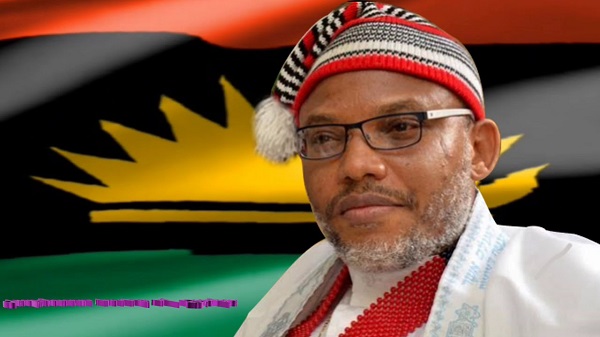The Indigenous People of Biafra (IPOB) and a human rights lawyer have strongly criticised the ruling by Justice James Omotosho of the Federal High Court, Abuja, which rejected the no-case submission filed by IPOB leader Mazi Nnamdi Kanu.
Justice Omotosho, in his ruling on Friday, held that the Department of State Services (DSS) had established a prima facie case against Kanu, stating that he must enter his defence.
The court ruled that evidence presented by five DSS witnesses was sufficient to warrant an explanation from the defendant.
But IPOB condemned the decision, calling it a miscarriage of justice and an attempt to shift the burden of proof onto Kanu.
In a statement issued Saturday by IPOB’s spokesperson, Emma Powerful, the group described the ruling as a “judicial charade” that defies constitutional protections.
“Justice Omotosho’s remark that Kanu ‘needs to explain certain things’ violates Section 36(11) of the Nigerian Constitution, which prohibits compelling a defendant to testify against themselves,” IPOB stated.
“Is the judge suggesting that Kanu fill the gaps in a case riddled with contradictory witnesses and no investigation report?”
The group argued that the ruling reflects an ongoing trend of Abuja courts prioritising executive interests over impartial justice.
Also reacting, Human Rights Lawyer and Public Advocate, Christopher Chidera, faulted the court’s decision, saying it represents a dangerous departure from legal norms.
“Justice Omotosho’s ruling failed to properly evaluate the sufficiency of the prosecution’s evidence, which fell apart under cross-examination,” Chidera said.
He further criticised the court for relying on a repealed law, the Terrorism Prevention (Amendment) Act of 2013, saying it renders the charges a “legal nullity.”
According to Chidera, the Evidence Act (Section 122) obliges courts to take judicial notice of repealed legislation, and ignoring this undermines the court’s jurisdiction.
He warned that by asking Kanu to “explain” himself in such a context, the court had improperly shifted the burden of proof to the accused, a direct violation of constitutional rights and international fair trial standards.
“This ruling sets a dangerous precedent, compromises judicial independence, and further erodes public trust in the Nigerian judiciary,” Chidera added.
He called on the Court of Appeal to review and correct what he described as “egregious legal errors,” while urging the Nigerian Bar Association and the National Judicial Council to investigate repeated lapses in adherence to due process in the case.
Chidera also appealed to the international community to monitor the proceedings, noting that continued violations of the International Covenant on Civil and Political Rights (ICCPR) and the African Charter on Human and Peoples’ Rights may be at stake.
“A trial based on a defunct law, lacking credible evidence, and placing the burden on the defendant is not justice, it’s political theatre in legal disguise,” he concluded.









